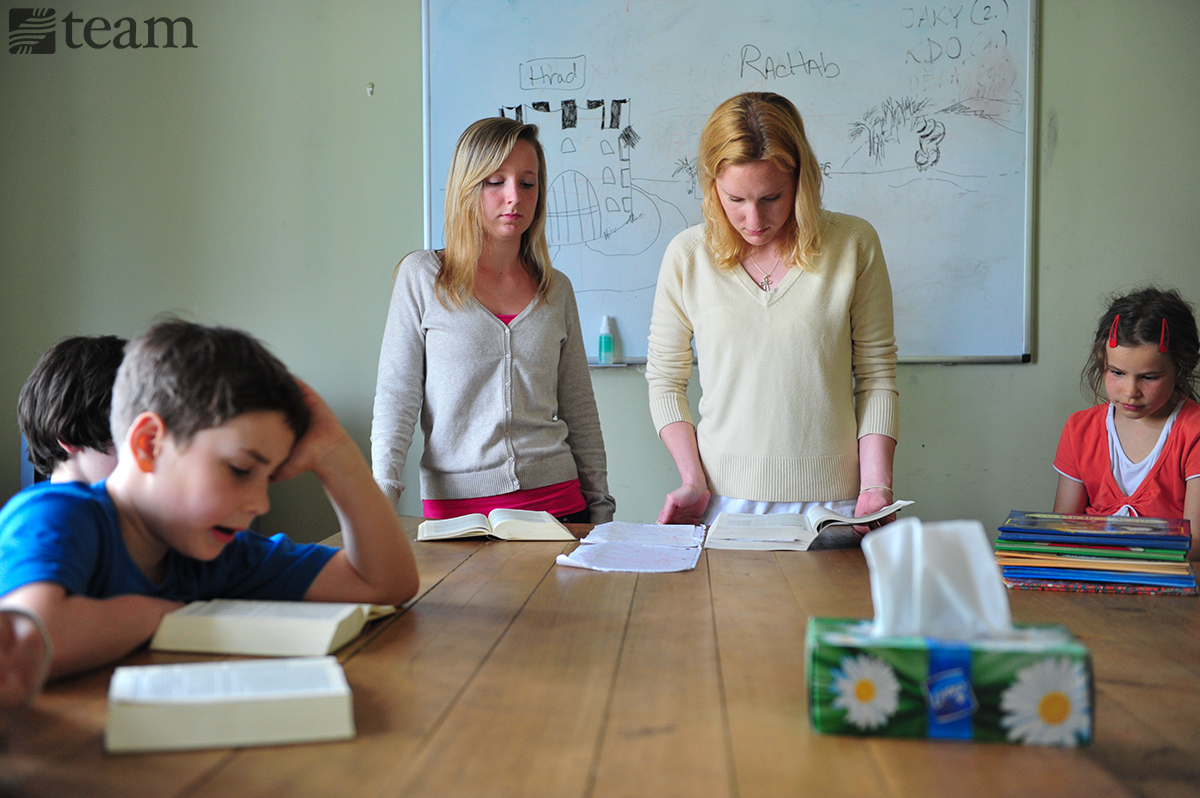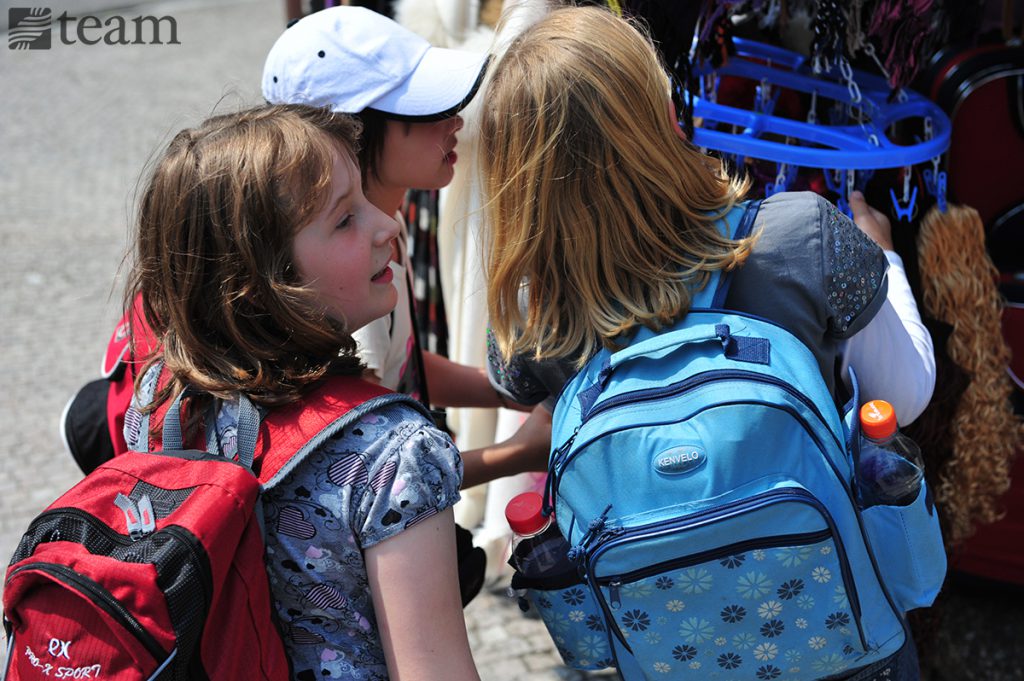
Missionary Life, Sending Churches
Helping Missionary Kids Thrive on Home Assignment
April 22, 2020
by admin

For most of us, missionary kids are an anomaly of life. They come to our churches for a year or a single Sunday while their parents are on home assignment. And we hardly get to know them before they leave again for the mission field.
But on the Global Missions Podcast, TEAM Missionary Kid Coordinator Valerie Williams explains why these kids need your love — and how you can impact their lives in just one church visit.
Listen to the podcast episode to find out:
- What “home” means to missionary kids
- What to do before missionary kids come for a visit
- How to make the church experience less intimidating
- The power of truly listening
- How to keep connecting after a missionary kid leaves
Inspired by the podcast, we also asked missionaries for real-life examples of how churches and friends have helped their kids thrive on home assignment. Check out their ideas, and talk with your church body about what you can do to help missionary kids on home assignment.
1. Build a welcome basket or road trip kit.
Before a word is spoken, a welcome basket says, “We care about you and have been looking forward to your arrival.”
“A few of our churches gave [our] girls little baskets with small gifts or gift cards,” says Jessica Malec, TEAM missionary to Peru. “They really enjoyed this, no matter how big or small it was.”
When Kacie Mann’s family arrived from Papua, Indonesia, a friend had made road trip kits with coloring books, crayons, little toys and snacks.
“We had supplies for our kids, but especially for little ones, their short attention spans mean they get bored of what they know,” Kacie says, “and a new pack of things — even cheap dollar store things — is so great for passing the time in the car.”
If you have kids, get them involved in making the welcome baskets or road trip kits. Let them pick out toys and write notes. The gift basket could even include an invitation to a playdate, showing the missionary kids that they have friends at the ready.
2. Provide stability and rest.
Every kid needs stability and rest. But that’s hard to find when you’re driving across the country or hopping from church to church. Missionary parents work hard to give their kids a break, but there are a few ways you can help.
If the family is staying in one spot, offer to take the kids to the same church, even when parents can’t go. That way, they can make friends, join classes and set into a natural weekend rhythm.
“We didn’t go with the entire family to every supporting church that we needed to visit. … We focused as a family on our home sending church so they would get well-connected,” says Gretchen Potma, TEAM missionary to the Czech Republic.
Find out the family’s travel route and look up which museums, historical sites, national parks and other excursions they’ll pass on their travels. Then, offer to give them a day at one of them. It will give the kids a chance to just be kids, and it will help everyone make great memories together.
Besides speaking at churches, missionaries will visit supporters at their homes, take them out for coffee, speak at Bible studies and more. Offer to be their go-to babysitter, so kids have somewhere familiar to go. This works even better if you have kids of a similar age and can turn it into a playdate!

Constant travel can be stressful for missionary kids on home assignment. Give them a more restful experience by sending their family on a fun outing.
3. Lend old toys.
“We don’t bring many toys with us from our home in Austria,” says TEAM missionary Melissa Lundquist. So, it meant a lot when friends let their boys borrow a box of Duplo and a box of Playmobil.
TEAM missionary to Papua Susan Cochran says her home church “collected toys to have ready for our kids, including a big tub of Lego, bikes and a trampoline for our backyard.”
Before you sell your kids’ old toys, find out if you know age-appropriate missionary kids who will visit soon. Whether the kids are there for a year or a few months, these simple items will make their time easier. Plus, it’s a huge help to the parents!
“[Borrowing old toys] allowed us to not stress about investing in something that will only be used for a year and then sit in storage or be given away,” says Eric Kroner, TEAM missionary to Chad.
4. Make it easy for missionary kids to jump back into life.
Missionary kids on home assignment don’t have long to make friends, learn new activities and build a life before they go back to the mission field. Generally, the longest home assignment only lasts one year. So make sure it’s easy for missionary kids to quickly jump into church activities.
Gretchen suggests having a family assigned to connect with missionaries before their visit to a church, especially at large churches. The assigned family can help the missionary family find Sunday school classes, sign in kids and tell them what’s happening in the church.
And even before missionaries come home, Kurt zurBurg, missionary to Ukraine, says to read missionary newsletters and see what they’re saying about the kids.
“If they do try to contact the family, be sure to ask about the kids and remember what they are in interested in as they share,” Kurt says. “Take notes if needed.”
Find ways to get your own kids familiar with the missionary kids, as well.
“One Sunday school teacher took pictures of our kids to leave up on the classroom wall so other kids could remember and pray for our kids,” says Susan.
5. Rekindle old friendships.
Outside of church, be bold in setting up playdates if you have similarly aged kids. Missionary kids on home assignment deeply miss their friends abroad.
“Our kids can get overwhelmed, unsure how they fit in, what’s their place now after being gone,” says Eric. A gift of genuine friendship can be the difference between a fantastic home assignment and a long, lonely one.
“We … tried to spend as much time with their friends as possible,” says Jessica. “We had park dates, went hiking, took friends to lunch, had sleepovers, had game afternoons and parties.”
When Amanda Burleson’s family came home from South Africa, a supporter took them on a beach weekend with their own family. “That was really special,” she says.
As kids get older, it can be harder to arrange friendships, so talk with your teens about what returning missionary kids are going through. Encourage them to make a new friend — one who will have a unique perspective to share.
6. Don’t pressure missionary kids to be part of their parents’ presentations.
Some missionary kids will eagerly hop on stage to sing a song in a foreign language. Other missionary kids would rather die. It’s important to remember that their parents made the decision to go overseas, while they were likely born into it. So, before a missionary family visits, ask them what they’re comfortable doing.
“If [the kids] want to play a song on the piano for a church service, let them. But don’t force them,” says Melissa. “We included them as much as they wanted to be included.”
Be prepared for missionaries to leave their kids with their grandparents, where they can feel that important sense of stability. And if they do come, let the kids be kids. Look out for their needs.
“When we spoke at one supporting church, a friend made a special effort to make the morning special for our son, giving him a tour of the library and helping him pick out books to read while we were speaking,” says Susan.
7. Ask questions and acknowledge each missionary kid’s journey.
When a missionary family comes to town, we tend to gravitate toward the parents. After all, they were our friends before they left, and they’re the ones doing big, exciting ministry. But missionary kids want to be asked about their lives, just like anyone else.
“[Our] girls know a lot about Peru, and they have stories to tell of our time there,” Jessica says. “It was really meaningful when someone would direct their questions to them.”
Kurt encourages supporters to show genuine interest in missionary kids as people, not just as church planters. “Ask them about regular life things in Ukraine, and not stuff like, ‘Tell us about how you share Jesus with your friends in Ukraine.’”
Some missionary kids will be eager to talk about ministry. Others will be more reserved. Still other missionary kids may not have a relationship with God at all. Get to know each kid to find out where they are spiritually and what they enjoy talking about.
A Testament of God’s Love
Ultimately, helping missionary kids thrive on home assignment is all about treating them like people. What would you want and need in a strange place? How do your kids feel on long car trips? What questions did you like to be asked as a child?
Start asking these questions, and you’ll find ample ways to serve the missionary kids in your life. You’ll be a testament of God’s love for them. And you’ll enable their parents to keep serving and sharing Christ in foreign lands.
Want to learn more about serving missionary kids and their parents? Check out our Church Engagement page for an abundance of resources! Learn how to support missionaries in practical ways, and talk with one of our coaches to create a missionary support strategy!


